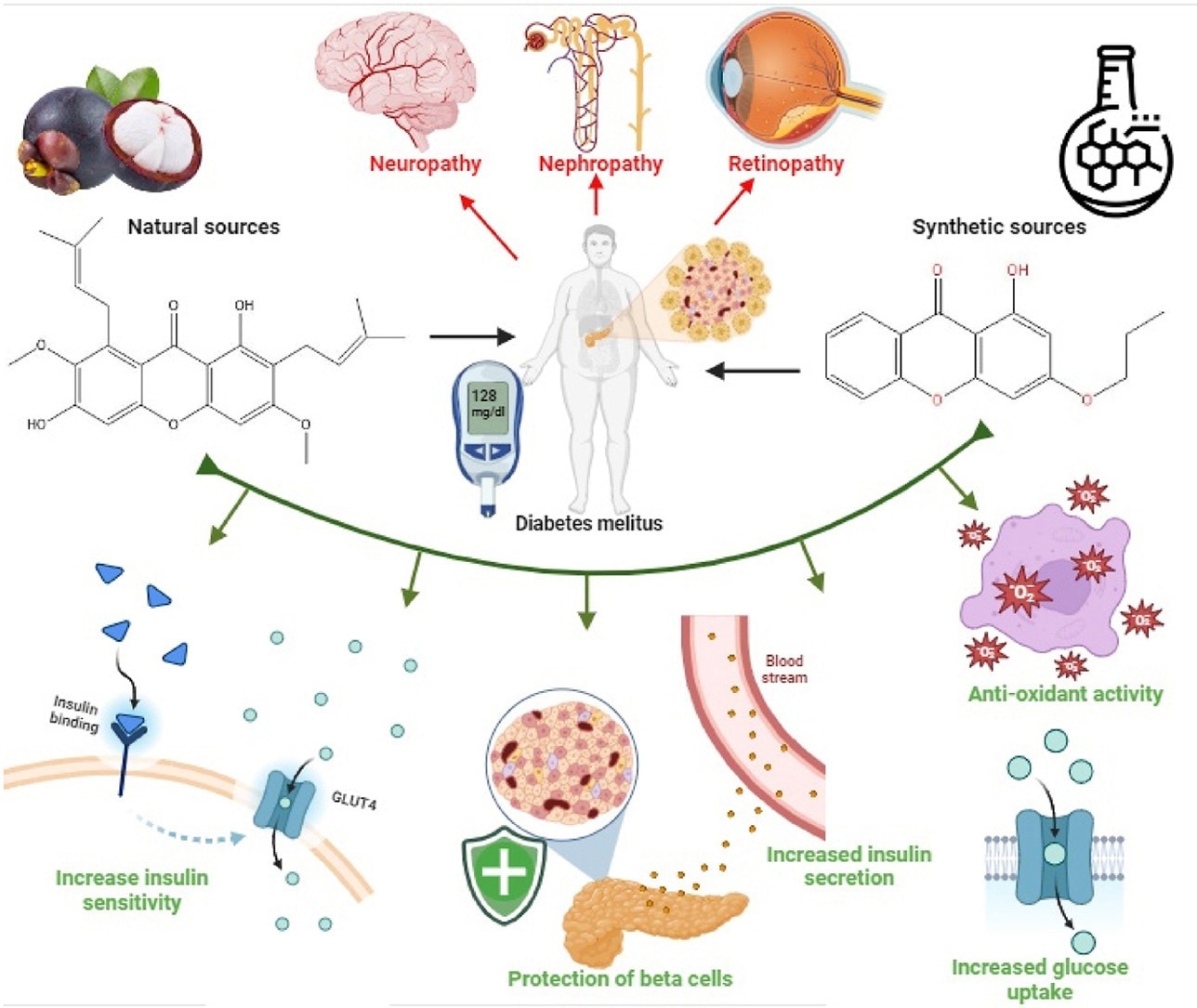Diabetes is a chronic metabolic disease characterized by reduced insulin secretion, reduced glucose utilization, and increased glucose production. These factors collectively lead to the development of hyperglycemia or high blood glucose. Diabetes is divided into two main categories, i.e., type 1 and type 2 diabetes.
The primary hallmark of type 1 diabetes is the depletion of pancreatic beta-cell mass and subsequent insulin insufficiency. A complex interaction between specific genetic factors, autoimmune response, and specific environmental factors is responsible for the pathogenesis of type 1 diabetes.
Type 2 diabetes is more prevalent than type 1 diabetes. The pathogenesis of type 2 diabetes can be attributed to a complex interaction between genetic predisposition and certain inherent factors (hypertension, obesity, physical inactivity), which can collectively lead to reduced insulin secretion or insulin resistance and subsequent induction in hepatic glucose synthesis. All these factors collectively result in increased blood glucose levels.

Graphical abstract indicating the effectiveness of xanthones in the treatment of diabetes.
Xanthones
Xanthones are natural polyphenolic compounds with diverse biological activities, including antioxidant, anti-inflammatory, and anticancer properties. Garcinia mangostana, commonly known as mangosteen, is the most enriched source of xanthones. Two most prominent xanthones found in mangosteen are α-mangostin and γ-mangostin.
Hypericum perforatum, Polygala species, Swertia chirayita, and Morus alba are other potential sources of xanthones, including hyperforin (polyprenylated acylphloroglucinol), 1,3,7-trihydroxyxanthone, swerchirin, morusin (prenylated flavonoids), and albanol A (benzofuran derivatives).
Xanthones in diabetes management
Several studies have identified strong antidiabetic effects of some xanthones, including gambogic acid, α-mangostin, γ-mangostin, mangiferin, hypericin, swerchirin, and chebulagic acid. These compounds have been found to increase insulin sensitivity, modulate glucose metabolism, and prevent oxidative stress and inflammation through various pathways.
The major molecular targets of xanthones in diabetes management include AMP-activated protein kinase (AMPK), peroxisome proliferator-activated receptors (PPARs), α-amylase, and α-glucosidase.
Xanthones as adjuvants
Chronic inflammation and oxidative stress are significant hallmarks of diabetes. The antidiabetic potency of xanthones can be attributed to their potent antioxidant and anti-inflammatory properties.
The integration of xanthones as adjuncts to existing diabetes medications represents a compelling avenue for enhancing the management of diabetes and related metabolic disorders.
Evidence indicates that xanthones can maintain glucose homeostasis by improving insulin sensitivity and facilitating cellular glucose uptake. The insulin-sensitizing activity of xanthones can be attributed to their ability to improve pancreatic beta-cell functions.
Dyslipidemia, characterized by irregular blood lipid levels, frequently occurs alongside diabetes. Xanthones have shown efficacy in maintaining normal blood lipid profile by regulating lipid metabolism, effectively preventing cardiovascular complications.
Moreover, xanthones can be useful in ameliorating diabetes neuropathy and diabetes-related kidney complications because of their neuroprotective and kidney-protective activities.
These observations highlight that combining xanthones with traditional diabetic therapies, such as insulin or oral antidiabetic drugs, may lead to better glycemic control and improved management of diabetes-related secondary complications.
Antidiabetic mode of action of xanthones
Xanthones exert antidiabetic effects through robust antioxidant and anti-inflammatory properties.
Xanthone derivatives that have shown strong anti-inflammatory activities include magniferin, β-mangostin, inophinnin, cudratricus xanthone A, dulxisxanthone F, ellidifolin, swerchirin, 2,8-dihydroxy-1,6-dimethoxyxanthone, cowaxanthone B, and γ-mangostin.
Evidence indicates that xanthones inhibit the release of pro-inflammatory cytokines [tumor necrosis factor-alpha (TNF-alpha) and interleukins] and COX-2 enzyme, which is responsible for mediating inflammation. Moreover, xanthones can inhibit inflammation-inducing signaling pathways, including the nuclear factor kappa B (NF-κB) pathway.
Regarding antioxidant properties, evidence indicates that xanthones can suppress oxidative stress by donating electron and neutralizing reactive oxygen species (ROS). By counteracting oxidative stress, xanthones can preserve beta-cell functions, improve insulin secretion, and inhibit the production of advanced glycation end products (AGEs).
Both natural and synthetic xanthones have shown efficacy in improving beta-cell viability and functionality.
Among naturally occurring xanthones, mangiferin has shown efficacy in increasing beta-cell mass by inhibiting apoptosis. Alpha-mangostin and cudratricusxanthone A have been found to protect beta-cells from cytokine-induced apoptosis.
Among synthetic xanthones, hydroxyxanthone, xanthone-triazole derivatives, and xanthone amine derivatives have shown beta-cell protective activities.
Xanthone-mediated preservation of beta-cell viability and functionality is associated with improved insulin secretion. Xanthones can also influence protein kinase C (PKC) pathways, regulating ion channel activities on beta-cell membrane and subsequent insulin release.
Xanthones in the management of diabetic complications
Diabetic nephropathy
Diabetic nephropathy is a serious kidney complication that can potentially lead to end-stage renal failure. Mangiferin has been found to ameliorate diabetic nephropathy in rats by suppressing AGEs and oxidative stress through the induction of glyoxalase1 (Glo-1) activity.
Alpha-mangostin protects against diabetic nephropathy by mitigating endoplasmic reticulum (ER) stress-induced renal cell apoptosis in diabetic rats.
The phenolic aqueous extract of mangosteen has also shown significant efficacy in mitigating glucose intolerance, metabolic disturbances, oxidative stress-related kidney damage, and cellular apoptosis in diabetic mice.
Diabetic retinopathy
Diabetic retinopathy is a serious eye complication and a leading cause of newly-onset blindness in diabetic patients.
Alpha-mangostin supplementation has been found to reduce retinal oxidative stress, inflammation, and glycation-related factors and improve blood flow and barrier function in diabetic rats, suggesting its potency in ameliorating diabetic retinopathy.
Mangostin has been found to prevent retinal neovascularization by reducing angiogenic sprouting and vascular endothelial growth factor (VEGF)-induced increases in bovine retinal endothelial cell permeability, proliferation, migration, and tube formation.
Mangiferin has been found to prevent retinopathy by altering the PI3K/AKT/mTOR signaling pathway and subsequently reducing retinal capillary endothelial cell angiogenesis in rats.
Diabetic neuropathy
Diabetic neuropathy is characterized by sensory loss and pain in the lower extremities, which eventually occurs in 50% of diabetic patients.
Xanthones isolated from G. mangostana Linn.'s root bark, including α-mangostin, β-mangostin, and 3-isomangostin, have shown a strong ability to inhibit aldose reductase, which may have beneficial impact on diabetic neuropathy.